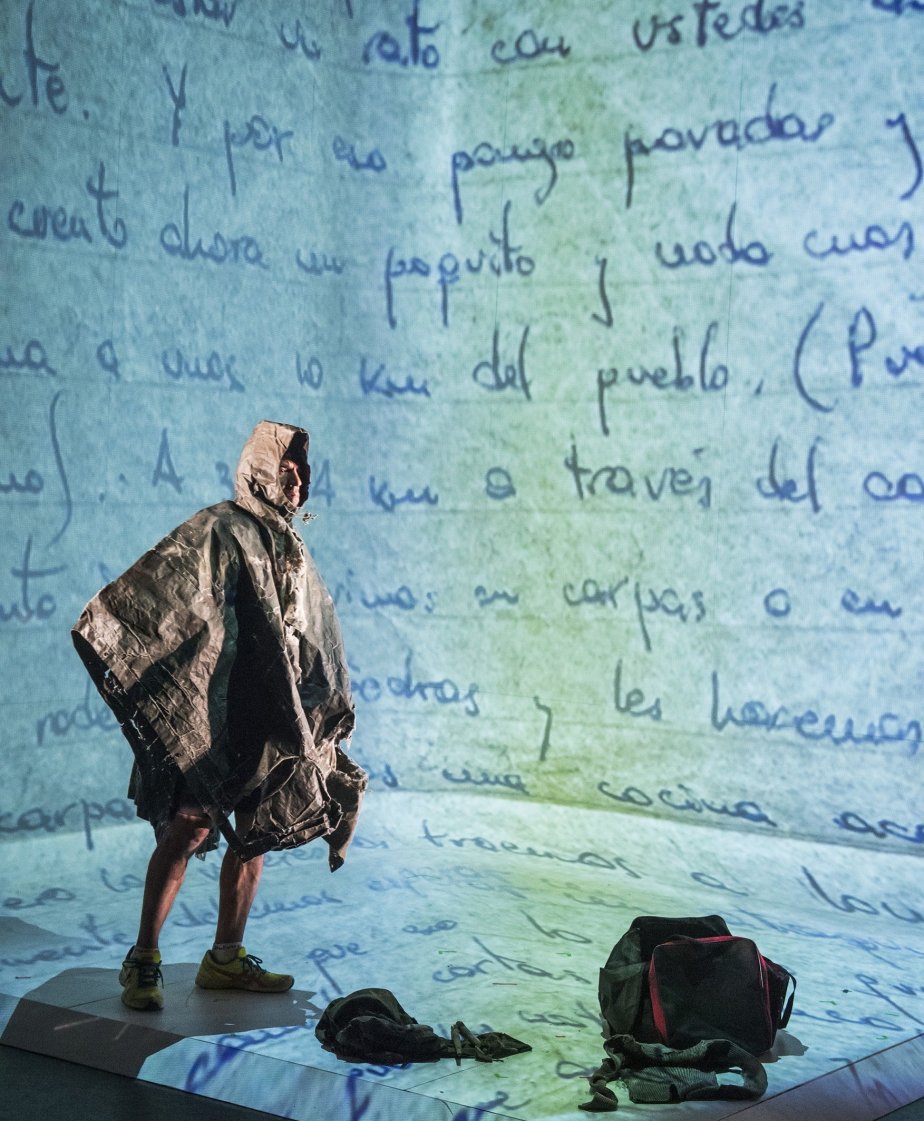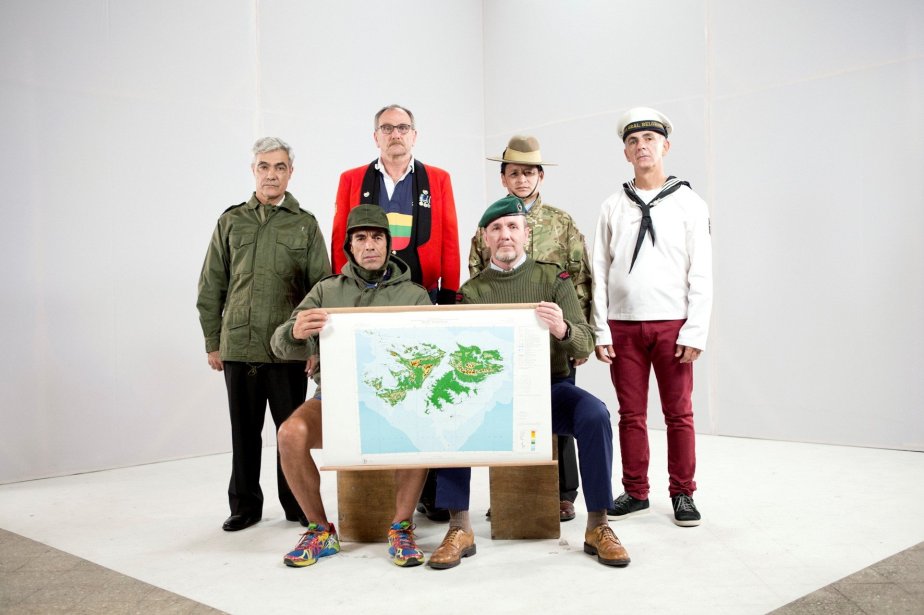
HOME
Written and Directed by Lola Arias
A LIFT production
A leading voice in Argentinean theatre Lola Arias has created something quite extraordinary with Minefield. Bringing together on a stage, six veterans of The Falklands War who do not speak each other’s language and who were facing each other on the battlefield in 1982. This theatrical venture is itself a potential minefield as it is a piece of lived history representing their individual, unique experiences of the war. This is not theatre retelling the history of either a war, a country, or of particular regiments in specific battles but it is a deeply personal sharing of what it is like to live through a war and forever carry the emotional consequences like a permanent kit bag.

The six men are all now veterans in their fifties. David Jackson spent the war listening and transcribing codes while sometimes keeping one ear tuned to Tony Hancock on BBC World Service. He is now a psychologist counselling veterans having himself suffered PSTD (Post traumatic stress disorder). Lou Armour was front page news in both countries when taken prisoner in The Falklands at the outbreak of the war on 2nd April 1982 . Now he teaches children with learning difficulties and may have caught the acting bug. Sukrim Rai was one of the reknown Gurkhas who now works as a security guard and can finally live in the U.K.
The Argentinians are Ruben Otero who survived 41 freezing hours in a lifeboat after the ARA General Belgrano was sunk. He wears a t shirt stating the Malvinas belong to Argentina and plays in a successful Beatles tribute band. Gabriel Sagastume was a reluctant soldier who is now a criminal lawyer and is absorbed by details of the war. Marcelo Vallejo was a mortar direction controller, who struggled with PTSD and depression. He survived addiction and a suicide attempt by drowning. After support and treatment he learned to swim and is now a successful triathlon champion.
The reality is they are neither heroes or monsters but just a group of guys sent to do a job. The major difference between them is language and the overhead subtitles are a constant reminder of how differences can be overcome.
The men’s stories are told in chapters using a range of techniques. The use of rubber masks effectively put Margaret Thatcher and General Galtieri on stage. Screen projections show the exquisite minutiae of love letters to Gabriel’s wife or tiny airfix soldiers on a map retelling a story of hungry men pinching food from a farm and being blown up by a land mine. A tiny plastic leg in a stripe sock evokes the remains of a lost friend and comrade. Front page images from GENTE in Argentina show Lou after his capture. Powerful usage of sound includes the sound recording of the actual jet fighters that nearly killed David and his comrades. At other times the men become a group singing and playing guitar and drums together. There is the light relief of a squaddie’s disco or the thundering drum solo of Ruben whose shouts for help went unheeded for 41 hours. An Argentinian wallet gratefully given to a fearsome Gurkha who felt it was better to capture than kill. The poignancy of Marcelo donning the battered cape he retrieved from the Malvinas 27 years later. A close up of Lou as he remembers the death of a young soldier who in speaking English as his dying words has haunted Lou ever since.
A therapy session between David and Marcelo is a powerful reminder of how this piece has worked as group therapy for these men. Cathartic at times and also re-opening old wounds on occasions such as April 2nd, the Argentinian Remembrance day. The skill of this piece is to never preach but to seek to share, reflect and understand how our past informs our present. As a psychotherapist I appreciate the delicate balance that Lola Arias has created and maintained in this group therapy approach to this piece of unique verbatim theatre.
Minefield has brought together six men who are united by sharing the same experience of losing friends and leaving them behind on a rocky, unforgiving landscape. This war lasted ten weeks according to Google, but for these men it was 74 days because each day mattered just as each life lost, injured or mentally scarred mattered. They mattered then and they still matter now. As they perform their last song together they unite as a potent force asking their audience,
What would you fight for? Would you go to war?…..Have you ever killed anyone?… Have you watched a friend die?
The final words are from Sukrim in his native language. Translated they simply and wisely say,
Killing is never winning. Fight with the pen NOT with the bullet!! If the pen wins, fine… If not, nobody is killed.
Viva! Spanish and Latin American Festival 2018
All images by Tristram Kenton
Thank you so much for the review.
The interesting point that is raised and asked so often. Has this been therapeutic for us? So in a sense has this been group therapy?
Of course the camaraderie, sharing stories, connection with the many audiences and the unspoken bond from war undoubtedly have therapeutic elements. However to assume that this collectively forms a group therapy is missing a fundemental element of the story telling that takes place. Our ‘therapeutic’ journey is as individual and unique as the very stories we tell. If the auditions and rehearsals were part of that therapy then it was like no other group therapy I have attended or facilitated. 😂
For me, and I can only speak for me, at the start of this process I felt emotionally resilient to embark on this journey. I have my moments. I experience deep sorrow and loss, I experience feelings of anger and resentfulness and I laugh so much tears run down face. Importantly I m comfortable in my own skin.
Thank you coming to witness our stories.
As a pyschotherapist you will interested to know in the therapy scene I have yet to read the English translation of what Marcelo says. I obviously know the main points from his story from the rehearsal process but word for word, no. This means I can concentrate 100% on the telling of the story through his tone, body language, nuances of NVC. I feel this gives that seen its authenticity.
Kind regards
David aka Maggie.
LikeLiked by 1 person
Thanks for the reply David. I grew up in N.I. so know may people who suffered trauma and soldiers who did tours all over the World. I still have postcards and letters sent to me by my cousin whilst stationed in The Falklands. I think The Royal Irish Rangers went in soon after the end of the war.
I think the telling of our stories and how we experience them being witnessed by others is hugely important. Thank you all for participating and allowing so many people to be witness to Minefield/Campo Minado.
LikeLike